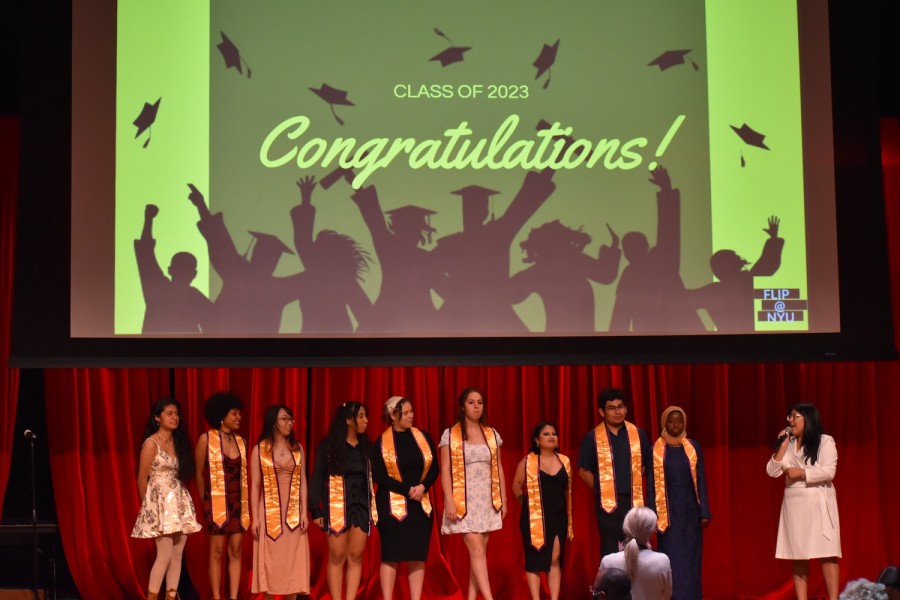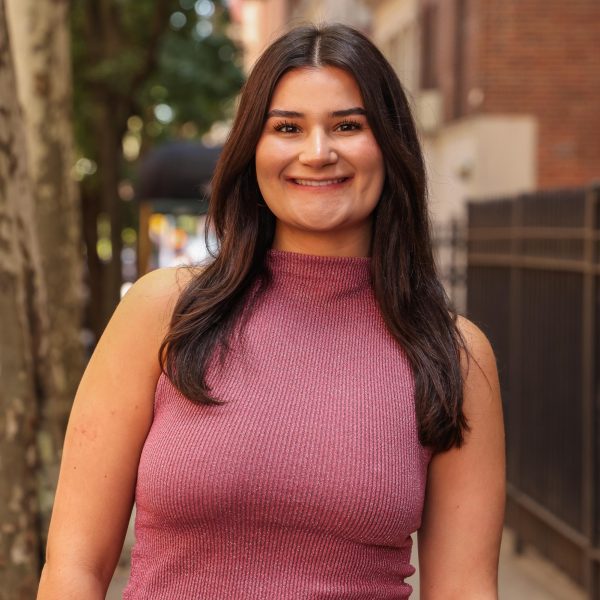NYU holds first-ever grad ceremony for first-generation students
Approximately 200 students celebrated their upcoming graduations at NYU’s first ceremony dedicated to first-generation students.
First-generation NYU students gathered at the Kimmel Center on Friday, April 21 for the university’s First Generation Graduation ceremony. (Bruna Horvath for WSN)
April 25, 2023
Having grown up in a low-income family in Philadelphia, CAS senior Donovan Dixon thought that attending college was improbable. This May, however, Dixon will be the first in his family to graduate college — an achievement that was celebrated in the first-ever ceremony dedicated to first-generation students since NYU’s founding.
Dixon and around 200 other first-generation students attended the ceremony on Friday, April 21, at the Kimmel Center for University Life.
“It’s been a very big part of my identity here at NYU — having the opportunity to be part of the first celebration is definitely something I’m grateful for,” Dixon said. “Coming to NYU was already something that was crazy that happened to my life. There never really was a sense that college was for certain.”
The ceremony was conceived by NYU’s chapter of the First-Generation Low-Income Partnership — a club for first-generation and low-income students to connect with peers of similar backgrounds. It was all arranged in only five months, according to Michelle Lucero, who serves as the community outreach co-chair of the club (which is also known as FLIP@NYU).
Lucero said that since the graduation ceremony was planned at the last minute, the club had not accounted for the event in its $2,500 annual budget. To work around this, FLIP@NYU initially wanted to work with the university’s Center for Multicultural Education and Programs. But after meeting with the center’s assistant director, Lucero found out that the center would be unable to sponsor the event since “first-generation” doesn’t fall under a specific cultural identity.
The club instead asked the Office of the Dean of Students and the associate dean of the Gallatin School of Individualized Study for financial support. Rafael Rodriguez, the dean of students, who is himself a first-generation college graduate, provided the largest donation to the ceremony, according to Lucero. Patrick McCreery, the associate dean of students at the Gallatin school, gave the second-highest amount.
Lucero said that they struggled to navigate the U.S. education system in the past, but that they felt more comfortable in college once they found a community with FLIP@NYU.
“The importance of our ceremony is to really make us seen, make us heard,” Lucero said. “It definitely makes a difference to have a community of people who you can relate to.”
At the ceremony, Yvonne Erazo, who is a director in the Office of the Dean of Students overseeing student basic needs, presented students with certificates and stoles for graduating. Students gave speeches, and attendees enjoyed food, refreshments, music and a photo booth.
Chris Sinclair, the executive director of the national First-Generation Low-Income Partnership nonprofit, also gave a speech to the graduates, many of whom are people of color, about how many of them would not have had access to an NYU education when the university was founded in 1831.
“In 1831, if somebody who looked like you or me were on this campus, we would not be students,” Sinclair said. “We would be slaves or indentured servants. I want you to really think about the fact that you are graduating from an institution, at whose founding, was not made for you. I want you to remember just how improbable it was that you would make it. Because nobody planned for us to be here, but we made our space anyway.”
CAS senior Andrea Cortés said that support from NYU faculty has helped her feel more secure in her identity as a first-generation student. She mentioned that having events like the ceremony for first-generation students gives them the opportunity to support one another.
“During my first year, I compared myself a lot to my peers who were also equally brilliant, but I felt that I didn’t have the same resources as them,” Cortés said. “I felt really at a disadvantage. That was really hard for me to work with, working through that part of my identity and not feel shame for being first-gen but instead feel empowered that I’ve been able to overcome a lot of challenges.”
Contact Bruna Horvath at [email protected].




























































































































































